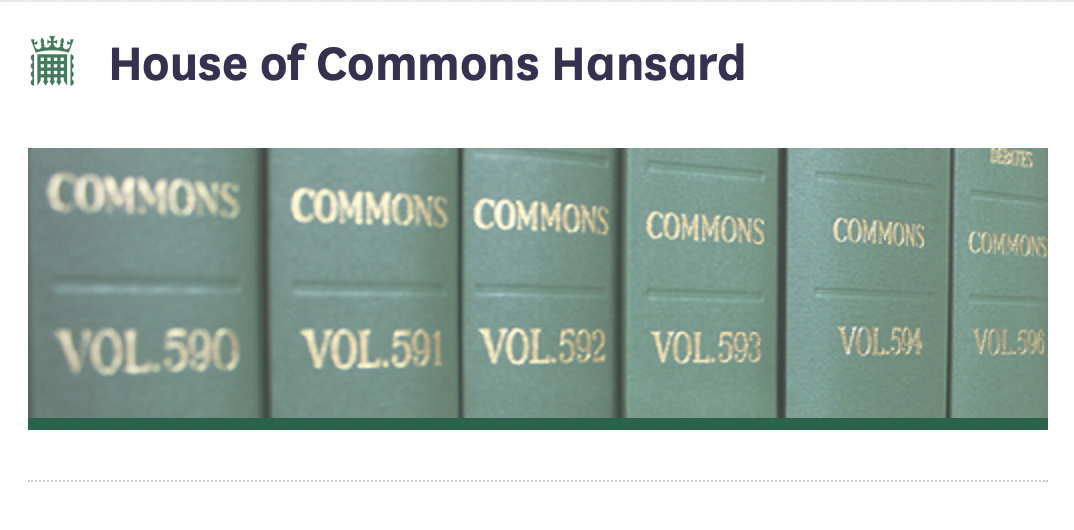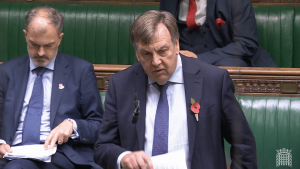Chris Bryant Shadow Minister (Creative Industries and Digital)
First, I pay tribute to my much-loved neighbour, my hon. Friend Alex Davies-Jones, who led for Labour during the last round of proceedings on the Bill, and to my hon. Friend Seema Malhotra, who led for us when the Bill was introduced.
Might I say a few words about the Minister? I do love the Minister. Members sitting on the Government Back Benches will not have been able to see the little wry smile playing on his face as he made his speech. Unfortunately, Hansard is not able to record that element of the way he presented his case. I will let the House into a secret: there are two versions of the Minister, or rather the Member. There is the Back-Bench Member, who I passionately agree with on nearly everything, and then there is the Government Minister, who has the Back-Bench Member sitting inside him somewhere, but has managed to lose him while taking on corporate and shared responsibility on the Government Front Benches. I bet that if he were in the Parliament that follows the next general election, and we debated these matters all over again, he would be articulating what I am about to say almost word for word, but today, he has articulated the Government position.
John Whittingdale Conservative, Maldon
Will the hon. Gentleman give way?
Chris Bryant Shadow Minister (Creative Industries and Digital)
Of course I will, to the right hon. Gentleman—another gentleman for whom I have a great deal of respect, and with whom I occasionally disagree.
John Whittingdale Conservative, Maldon
I just wonder whether the transformation that the hon. Gentleman describes, which occurs when somebody moves from the Back Benches to the Front Bench, applies equally to the Opposition and the Government.
Chris Bryant Shadow Minister (Creative Industries and Digital)
The right hon. Gentleman knows more about bobbing between the Back Benches and the Front Bench than most Members of Parliament in history, I think. It is obviously a problem; I do believe in shared responsibility of Government—we want Governments to act as a single body, and not irresponsibly—so I understand, but none the less, it is perfectly appropriate to tease the Minister when he has such a wry smile on his lips.
This Bill is a classic instance of how the Tory chaos of the past few years has been bad for Britain. It is long overdue, as the Minister said: it started in the Commons more than a year ago, on 25 April 2023, and it is so delayed that the carry-over motion had to be carried over. I cannot remember that happening for many years, but the Government had to do it last week. The Bill used to strike the right balance between the needs of different parts of the market, but Sir John Whittingdale was absolutely right to say that many stakeholders are certainly not happy with where the Government have landed. Intense lobbying of Downing Street from some parts of the market has led to the Government tabling amendments that would fatally undermine the Bill’s purpose and make it impossible for the CMA to do the job that we want it to do, namely, ensure fair competition in digital markets in the interests of consumers, investors and wider society.
I remind Members of what Sir Robert Buckland has said—it is good to see him in his place. He said that this is
“a market that is vulnerable—and, some would say, prone—to monopolistic abuse of market power.”—[Official Report, 20 November 2023;
Vol. 741, c. 58.]
During the first Second Reading debate on 17 May last year, the Minister said that
“competition must work hand in hand with consumer protections.”—[Official Report, 17 May 2023;
Vol. 732, c. 880.]
That is spot on, so why ruin the Bill? This is the nub of the matter. Saqib Bhatti said on Report that
“a small number of firms exert immense control across strategically critical services online because the unique characteristics of digital markets, such as network effects and data consolidation, make them prone to tip in favour of a few firms.”—[Official Report, 20 November 2023;
Vol. 741, c. 51.]
Again, he was absolutely right, but what the Government are doing today helps to tip the legislation back in favour of those few firms. It is a mistake. They pretend otherwise—the Minister has said that the amendments will not make any difference. In that case, why table them?
In an attempt to save the Government from themselves, the Lords have tried to return the Bill to its original shape with four sets of amendments, which I will now go through. The first set, Lords amendments 9 and 19, deals with proportionality. The original Government version of the Bill said that the CMA’s conduct in regulating digital markets had to be “appropriate”. The Government then changed that to “proportionate”. Lords amendment 9 would change it back to “appropriate”. I believe that the Government version would, in effect, render any challenge to the CMA’s conduct a test of the merits, rather than a judicial review, and provide big tech firms with limitless legal budgets with even more scope to tie the CMA up in lengthy legal wrangling. Jarndyce v. Jarndyce in the Court of Chancery would have nothing on the CMA in the High Court. The Government seem to be deliberately clipping the wings of the CMA, and Labour agrees with their lordships that in this area, the Bill should be returned to its original form.

